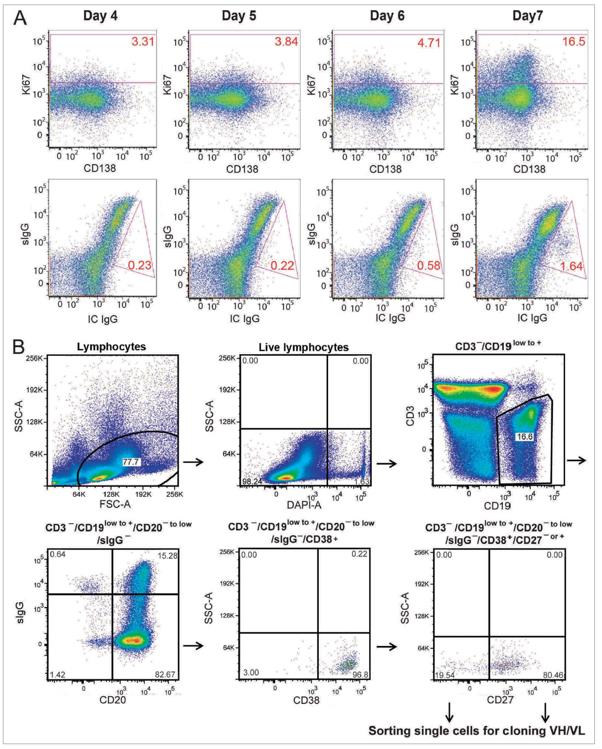- This product is an antibody that was generated by immunizing mouse against synthetic peptide. It is used only in in vitro assays.
Detailed Product Description
- Introduction: CD20 is a non-glycosylated surface phosphoprotein that has a molecular weight range of 33-37 kDa depending on the degree of phosphorylation. CD20 is expressed on mature and most malignant B cells, in a subpopulation of T lymphocytes and follicular dendritic cells. CD20 expression on B cells is synchronous with the expression of surface IgM and it regulates transmembrane calcium conductance, cell cycle progression and B-cell proliferation. CD20 is also associated with lipid rafts, but the intensity of this association depends on extracellular triggering, employing CD20 conformational change, and/or BCR (B cell antigen receptor) aggregation. After the receptor ligation, BCR and CD20 colocalize and then rapidly dissociate before BCR endocytosis, whereas CD20 remains at the cell surface. CD20 serves as a useful target for antibody-mediated therapeutic depletion of B cells, as it is expressed at high levels on most B-cell malignancies, but does not become internalized or shed from the plasma membrane following monoclonal antibody treatment. Diseases associated with CD20 dysfunction include Ms4a1-related common variable immune deficiency.
- Conjugate: None
- Antibody Isotype: IgG
- Applications: ELISA; IF; IHC
Technical Specifications
- Host Species: Mouse
- Species Reactivity: Gibbon; Gorilla; Human; Monkey
- Immunogen: Synthetic peptide
Product Property
- Purification: Ascites
- Format: Liquid
- Buffer: 0.03% sodium azide
- Storage: Short term: 4˚C. Long term: Store at -20˚C. Avoid freeze-thaw cycles.
Target Information
- Clone: PHE5
- Clonality: Monoclonal
- Alternative Names: B-cell differentiation antigen Ly-44; B-lymphocyte antigen CD20; B-lymphocyte cell-surface antigen B1; B-lymphocyte surface antigen B1; Bp35; CD20; CD20 antigen; CD20 receptor; Leukocyte surface antigen Leu-16; Lymphocyte antigen 44; Membrane-spanning 4-domains subfamily A member 1; membrane-spanning 4-domains, subfamily A, member 1; membrane-spanning 4-domains, subfamily A, member 2; MGC3969
- Entrez Gene ID: 931
The paper focuses on a study concerning the development of monoclonal antibodies from single rhesus macaque antibody-secreting cells, highlighting the NHP CD20 monoclonal antibody's role and significance. The researchers explore the efficient generation of monoclonal rhesus macaque's antibody-secreting cells. This, in turn, throws light on the ability of the NHP focus center to play a very important role in efficient vaccine design and profiling for the antibodies in non-human primates. On the other hand, unveiling a very sound protocol for efficient cloning of the genes encoding the immunoglobulin (IG) variable domain from rhesus macaque cells, cloning had a high efficiency of 90% for the variable light (VL) and heavy (VH) domains. For instance, the protocol was earlier demonstrated with the successful conduct of a study of the experimental dengue vaccine in which about 26.6% of cloned monoclonal antibodies had reacted to dengue vaccine antigens. Research investigators show that the monoclonal antibodies obtainable by the developed NHP demonstrate potential in enhancing the designs of vaccines and assessments of immunogenic responses in rhesus macaques, therefore, justifying isolated antigen-specific IG from single cells.
 1Fig. 1. Analysis of antibody secreting cells dynamic change post immunization, and sorting of single antibody secreting cells by flow cytometry.
1Fig. 1. Analysis of antibody secreting cells dynamic change post immunization, and sorting of single antibody secreting cells by flow cytometry.
Reference
- Weixu Meng., et al. "Efficient generation of monoclonal antibodies from single rhesus macaque antibody secreting cells." mAbs 7:4, 707-718
-
Q 1: How does CD20 Monoclonal Antibody PHE5 differ from other CD20 targeting therapies?
A: The CD20 Monoclonal Antibody PHE5 is carefully designed in the manner of ensuring that it is very specific in targeting any CD20-positive B-cells. Consistently such an antibody may pose a different avenue concerning immunogenicity, efficacy, and safety profile among the different CD20 therapeutics like rituximab, ocrelizumab, or ofatumumab. Evidently, PHE5 has certain unique attributes trodden in secrecy, the benefits of which would be reaped for focused research or therapeutic needs, and its attributes need to be weighed upon by researchers and clinical teams.
-
Q 2: What are some potential applications or benefits that may ensue by applying NHP-derived CD20 MABs in research or therapy, such as PHE5?
A: NHP-derived antibodies, such as PHE5, offer a better approximation physiologically and immunologically toward humans, with the result that they tend to decrease immunogenicity and provide a better chance for success in applications to humans. They are, therefore, of pivotal significance for the study into a myriad of conditions of the immune system, B cell-mediated as they may be, from autoimmune diseases to unique forms of cancer, and as such provide by far new lead information significantly to therapeutic development and medical strategies relying on individualized approaches.
-
Verifiable
By using CD20 Monoclonal Antibody (PHE5) from reactive biolabs, my experimental data are verifiable and the progress of my project is accelerated.
Click the button below to contact us or submit your feedback about this product.
This site is protected by reCAPTCHA and the Google Privacy Policy and Terms of Service apply.

USA
Tel:
Fax:
Email:
UK (for antibody and medium reagents only)
Tel:
Email:
Germany
Tel:
Email:
Enter your email here to subscribe.
SubmitFollow us on
 Cynomolgus Monkey PBMCs
Cynomolgus Monkey PBMCs